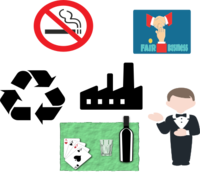Ethical factors affecting business: Difference between revisions
(Infobox update) |
(The LinkTitles extension automatically added links to existing pages (<a target="_blank" rel="noreferrer noopener" class="external free" href="https://github.com/bovender/LinkTitles">https://github.com/bovender/LinkTitles</a>).) |
||
| Line 38: | Line 38: | ||
[[Image:Ethical factors.png|200px|thumb]] | [[Image:Ethical factors.png|200px|thumb]] | ||
==Ethical factors concerning production processes== | ==Ethical factors concerning production processes== | ||
* eliminating unsafe working conditions, | * eliminating unsafe [[working conditions]], | ||
* avoiding processes and technologies that jeopardize the safety of the employees and public, | * avoiding processes and technologies that jeopardize the safety of the employees and public, | ||
* producing [[product]] safe for customers, | * producing [[product]] safe for customers, | ||
Revision as of 04:56, 20 January 2023
| Ethical factors affecting business |
|---|
| See also |
Ethical factors affecting business involve all processes and actions which influence managers and employee behaviour inside the company and with outside environment (customers, partners, competitors). Ethical concerns in management is included in Corporate Social Responsibility concept, and involve duties, morality, integrity, behaviour, what is good and bad for company, employees and society as a whole. There is many similarities between ethical and legal factors affecting business.
Business ethics and ethical business practices
Business ethics deals with moral issues (beliefs, norms, values, etc.) found in the business. It should be noted that business ethics is a term with quite a multifaceted meaning. A variety of content, which is attributed to business ethics depends on the context of its occurrence. Each approach, however, boils down to the general and the basic conclusion that economics should serve man, not vice versa. Entrepreneurs can not be guided in their actions solely by profit. Ethics, as having theoretical knowledge of fundamental importance for our actions, it is rational and reasoned knowledge of the values and duties of human action, arising from the fact of being human. Business ethics is concerned of limits to human economic activities.
Ethical issues in business
Business ethics is both part of the prescriptive (normative) ethics establishing standards of conduct, recommending certain behaviours, as well as descriptive ethics, describing the moral attitudes and behaviours of entrepreneurs. In principle, the practical goal of business ethics is to solve ethics problems in business.
Ethical factor in area of business communication
- proper marketing techniques, telling truth about products and services,
- informing customers, employees and partners about company's mission statement and goals,
- respecting religious and social values of employees, customers and partners,
- negligence in informing shareholders about company's situation, managerial ethics
- insider trading, hiding information about mergers, acquisitions, investments, etc.
Internal and external regulations concerning business behaviour
- industry specific regulations (marketing code, broadcasting code),
- regulations on discrimination in hiring and promoting,
- consequences of physical and verbal harassment in the workplace,
Ethical factors concerning production processes
- eliminating unsafe working conditions,
- avoiding processes and technologies that jeopardize the safety of the employees and public,
- producing product safe for customers,
- waste product utilization and recycling,
- profiting from products bad for health (drugs, cigarettes, alcohol) and people (gambling),
Ethical factors in motivation and human resources management
- priority of performance over well-being of employees,
- promoting unethical behaviours toward customers (cheating, misinformation),
- low trust between employees and management,
- promoting employees informing about unethical behaviour of superiors and colleagues,
- enforcing measures to discover and eliminate bribery, side-deals, preferential treatment, etc.
- creating healthy working conditions for employees
- discrimination of female employees by male superiors and colleges,
- implementing and enforcing codes of ethical practice (code of conduct) within company,
International trade and its influence on business ethics
- preferring fair trade products, over low priced products produced unethically (bad working conditions, low wages, etc.).
- preferring foreign suppliers from countries protecting environment, reducing CO2 emissions, using strict health regulations of farm products, implementing sustainable development, protecting human rights, banning children slave work, etc.
- changing native cultures by spreading products and life styles foreign to them,
- trading and cooperation with states at war, and embargoed by international community,
See also:
Check also other:
- Social and cultural factors affecting business
- Technological factors affecting business
- Economic factors affecting business
- Ecological factors affecting business
- Political factors affecting business
- Legal factors affecting business
References
- Donaldson, T., & Dunfee, T. W. (1994). Toward a unified conception of business ethics: Integrative social contracts theory. Academy of management review, 19(2), 252-284.
- Durnev, A., & Kim, E. (2005). To steal or not to steal: Firm attributes, legal environment, and valuation. The Journal of Finance, 60(3), 1461-1493.
- Goodpaster, K. E. (1991). Business ethics and stakeholder analysis. Business ethics quarterly, 1(01), 53-73.
- McWilliams, A., & Siegel, D. (2001). Corporate social responsibility: A theory of the firm perspective. Academy of management review, 26(1), 117-127.
- Pearce, J. A., Robinson, R. B., & Subramanian, R. (2000). Strategic management: Formulation, implementation, and control. Columbus, OH: Irwin/McGraw-Hill.
Author: Krzysztof Wozniak
